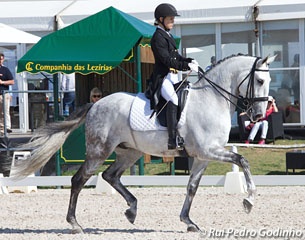
You know when you do something and you push yourself that bit too far. It can happen in many different ways. You might go for a run one morning, get home exhausted and sore and think "oops perhaps my body wasn’t ready to go that far!". You feel good for pushing yourself, but the next day you don’t get up and do exactly the same: you rest, maybe try and relax for a day or two, and then try again working up slowly.
Dressage is a sport that requires great patience on many levels, but particularly because of the mental and physically well-being and sustainability of our dressage partners. Perhaps your horse can do that today and tomorrow and for a week, but often you need to ask yourself do you want to have one awesome week, or years of joy and success?
Have you been to a competition and watched a really talented horse that was trying to do what the rider was asking, but seemed just overwhelmed: grinding his teeth, swishing his tail, eyes popping out of his head. The rider would ask for a simple transition and the horse would take off into a pirouette or begin tempi changes fanatically. The rider would ask for walk and the horse would immediately piaffe, nervously giving whatever it could because it just felt it was all too much.
That is of course because in that moment it was all too much. Quite often we see these horses, nervous, anxious, worried about what they should do or not do. They are not naughty nor disobedient, they just simply cannot cope mentally or physically with the pressure they are under. Of course there are exceptions and some horses are naturally more nervous than others. However, a lot of the time it comes down to the very basic rule of dressage, that just because a horse can do something, doesn’t mean he is ready to do it again and again and again.
Training a horse is not a race and if you treat it as such you will never win. When you push yourself too far you back off and try again slowly. Why then, if a rider pushes his horse and the horse starts to get nervous and anxious, showing signs of discomfort, stress, or fatigue, should a rider ask for more and more? A rider with tact, experience, and respect for the horse will -- when the horse shows signs that he is getting a bit lost or cannot handle something -- back off for a week, or maybe a month, and go back to basics.
When Batialo was young he was naturally a very forward moving horse and he loved to show off his extended trot. Often he would produce it without me asking. At that stage he didn’t have the physical strength to actually carry it out correctly, and so even though it felt and looked very powerful, it was not the moment for him to be producing that sort of work.
I spent three months doing a very slow, very rhythmic, very low key trot, simple transitions and gentle bending exercises. Gradually Batialo understood that power and energy was great, but not without the good work to carry it, and the mental capacity to understand that it must be on my terms.
They say that to build strong castles you need good foundations. In dressage you not only need good foundations, you need to constantly go back to those foundations and stay there for a while until you build back up to the castle again. It is not a case of “oh wow now I have built my horse up I will keep him at the top”. You must listen to your horse and remember that dressage it not a race, it’s a cha cha.
I have seen many posts recently talking about how in life we just need to understand that one step forward, then one step back is not failure, it’s a cha cha. Dressage is absolutely a case of adjusting and readjusting your expectations, reaching forward and then stepping back, until one day you and your horse will dance with the mental and physical balance that both you and he can cope with and thrive on!
by Sarah Warne - Photos © Rui Pedro Godinho - Astrid Appels